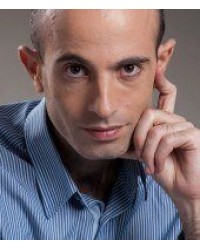

- #Yuval noah harari criticism how to
- #Yuval noah harari criticism series
- #Yuval noah harari criticism free

So why does he think "tech execs" - whoever they are - are somehow a breed apart? Television has consistently sought more attention, and a lower common denominator. Thus we got "The Machine that Changed the World," affecting everything from our dreams of velocity and self-determination, to environmental degradation.Įdward Bernays had his big PR insight by having protofeminists march with "torches of freedom" -cigarettes- creating a pseudoevent that doubled the market of smokers. Henry Ford was great because he saw that cars could be for everyone. Put in terms of biology or capitalism, that means that everything wants to extend as far as possible in its ecosystem- it's a question of maximizing your niche. To paraphrase Maslow, everything looks like a nail if you have a hammer in your hand. If tech leaders somehow banded together to form what Harari calls "a global safety net," no one could accuse them of being naive. "So yes, it can hack me, but it hacks me in order to protect me" from corporations or governments.īut Harari's most important message remains the alarm he is sounding about the widening opportunity and income gaps between a small number of powerful tech hubs and the rest of the world, most particularly emerging economies that are likely to be upended by automation and artificial intelligence. "I mean, we can't stop the progress of this kind of technology, but I would like to see it serving me," he said. In an interview with Wired editor Nick Thompson earlier this year, Harari posited the idea of an "AI sidekick," built exclusively to protect an individual consumer.
#Yuval noah harari criticism how to
Who better to help them expand their world view than Harari? He is a professor of history at Hebrew University and he knows how to frame arguments using examples and ideas that Silicon Valley can appreciate. of what their creations will do to society.” “Their understanding of history, politics, culture, society, this is not their strong part," he told me. But he does think they are naive about the impact of their systems. Having spent time with many of tech's leaders, Harari was quick to point out that he doesn't think their relentless pursuit to control and manipulate human behavior comes from a place of malice.
#Yuval noah harari criticism series
In the spring, Facebook CEO Mark Zuckerberg invited Harari to speak with him as part of Zuckerberg's 2019 personal challenge to convene a series of public conversations about technology and society. According to New York Times article, he's been fêted by Netflix CEO Reed Hastings, and he's addressed employees of Alphabet. Harari, weirdly, is revered in the very circles he's taking to task. What makes Harari's critique so powerful isn't the bluntness of his words, it is that he's in a unique position to get Silicon Valley to actually listen to his message. He concluded: "With the best intentions in the world, they are now captive by the machines they have created."

"To suddenly say, 'Well, this is a bad idea.' What will their shareholders think about that?" When I asked him in a Q&A (now viewable here) whether he thought the leaders of tech corporations were prepared to start a dialogue on addressing the inequalities wrought by their systems, Harari was skeptical: "The business model is to capture and hijack human attention and manipulate human attention," he said.
#Yuval noah harari criticism free
In a presentation he delivered earlier this month at the Fast Company European Innovation Festival, powered by Gucci-as he has in other remarks-he painted a dark picture of a future in which humans start to merge with the machines created by big technologies companies, stripping humans of free will, and leaving entire economies in the dust. Historian Yuval Noah Harari does not sugarcoat his criticism of technology and the people who create it. Thank you for checking out Mehta Data, a LinkedIn newsletter that focuses on innovation through the lens of creativity, design, social impact, leadership, and technology.


 0 kommentar(er)
0 kommentar(er)
